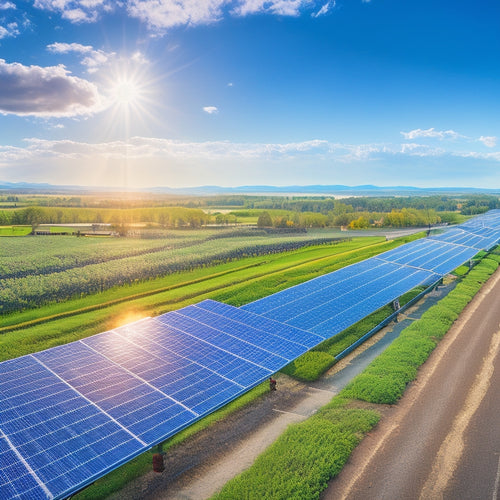
Why Investing in Battery Systems Matters
Share
By investing in battery systems, you're taking a significant step towards energy independence, reducing your reliance on non-renewable energy sources and converting your home into a self-sustaining power hub. You'll gain control over your energy usage, storing excess energy from renewable sources for later use, and minimizing energy loss through advanced battery management systems. You'll also protect your power supply during outages, reduce your energy bills by optimizing energy consumption, and maximize your solar power efficiency. As you investigate the benefits of battery systems, you'll find out how to tailor a system to your unique energy needs, revealing a future of energy freedom and financial savings.
Overview
- Investing in battery systems enables energy independence, reducing reliance on non-renewable energy sources and enhancing grid resilience.
- Battery systems provide backup power during outages, maintaining essential functions and reducing strain on the grid during peak hours.
- By storing excess energy from renewable sources, battery systems can significantly lower energy bills and achieve financial freedom.
- Advanced battery management systems minimize energy loss, optimize energy harvest, and guarantee continuous energy supply during disasters.
- Investing in battery systems future-proofs against rising energy costs, ensuring a sustainable and efficient energy solution for the long term.
Energy Independence at Home
By incorporating battery systems into your home, you can take a significant step towards achieving energy independence. This means you'll have more control over your energy usage and rely less on the grid.
With a battery system, you can store excess energy generated from renewable resources like solar or wind power, and use it when needed. By optimizing your energy storage with advanced battery management systems, you can maximize power in limited space and reduce energy loss with low self-discharge rates.
This not only reduces your reliance on non-renewable energy sources but also enhances grid resilience. By having a backup power source, you'll be better prepared for outages and emergencies.
Investing in a battery system is a smart move towards securing your energy future and enjoying the freedom that comes with it.
Protecting Your Power Supply
Optimize your power supply protection by integrating a battery system into your home's energy infrastructure. This safeguard guarantees a stable energy supply, even during grid outages or natural disasters. A battery system provides emergency preparedness, allowing you to maintain essential functions like lighting, refrigeration, and communication. By storing excess energy generated by your solar panels or wind turbines, you can reduce your reliance on the grid and maintain grid stability.
| Benefits | Description | Impact |
|---|---|---|
| Emergency Power | Provides backup power during outages | Maintains essential functions |
| Grid Stability | Reduces strain on the grid during peak hours | Prevents brownouts and blackouts |
| Renewable Energy | Optimizes energy harvest from solar and wind | Increases energy independence |
| Energy Security | Protects against power outages and natural disasters | Guarantees continuous energy supply |
| Reduced Downtime | Minimizes disruptions to daily activities | Maintains business and daily operations |
Lowering Your Energy Bills
You've safeguarded your power supply by integrating a battery system; now, let's investigate how this investment can also lower your energy bills.
By utilizing excess energy generated during off-peak hours, you can store it in your battery system and use it during peak hours when rates are higher. This smart technology allows you to optimize your energy consumption, reducing your reliance on the grid and resulting in significant cost savings.
Furthermore, it enables you to achieve energy independence, free from grid constraints, and take advantage of peak hour management and energy arbitrage.
With a battery system, you can shift your energy usage to when rates are lowest, minimizing your energy bills. This level of control and flexibility is key to revealing the full potential of your energy investment, providing you with financial freedom and peace of mind.
Battery System Design Essentials
A well-designed battery system is essential for maximizing energy savings and guaranteeing seamless integration with your existing infrastructure.
When designing your battery system, you'll need to evaluate the type of battery chemistry that best suits your needs. Different chemistries offer varying levels of efficiency, lifespan, and cost.
You'll also need to verify system scalability, so your battery system can grow with your energy demands. Additionally, incorporating advanced features like MPPT charging algorithms and precision voltage regulation can optimize energy harvesting and prolong battery lifespan.
A scalable system allows you to add or remove batteries as needed, assuring you're always optimizing your energy storage.
Maximizing Solar Power Efficiency
The key to releasing the full potential of your battery system lies in utilizing the maximum energy output from your solar panels. You can achieve this by optimizing the performance of your solar array.
Guarantee proper panel orientation, tilt, and cleaning to minimize energy losses. Additionally, implement an effective energy management system to monitor and control your solar power generation. This allows you to identify areas of improvement and make data-driven decisions.
Frequently Asked Questions
How Do Battery Systems Impact the Environment and Climate Change?
You reduce your carbon footprint by adopting battery systems, which enable efficient energy storage, decrease reliance on fossil fuels, and mitigate climate change by minimizing greenhouse gas emissions from power generation and transmission.
Can I Use Battery Systems for My RV or Boat?
You can upgrade your RV or boat with advanced battery systems, leveraging energy storage and power management technologies to optimize performance, reduce emissions, and gain freedom on the open road or water.
What Are the Typical Maintenance Requirements for Battery Systems?
You'll want to stick to regular maintenance schedules to maximize your battery lifespan, checking electrolyte levels, cleaning terminals, and monitoring charging/discharging patterns to guarantee peak performance and extend the life of your battery system.
Are Battery Systems Compatible With All Types of Solar Panels?
As you unfasten the power of solar energy, you'll find that not all battery systems are created equal. You'll need to choose between lead-acid, lithium-ion, or flow batteries, ensuring they're compatible with your solar panel type to utilize the energy freedom you desire.
Can I Install a Battery System Myself or Do I Need a Professional?
You can attempt a DIY installation, but be aware that battery systems involve complex electrical connections and Safety Considerations, so it's recommended you hire a professional to guarantee a safe and efficient setup that meets local building codes.
Ready to Buy
As you weigh the benefits of investing in battery systems, remember that energy independence is within reach. By protecting your power supply and lowering your energy bills, you'll reap long-term rewards. A staggering 63% of homeowners with solar panels also invest in battery storage, citing backup power and grid independence as top motivators. By maximizing solar power efficiency, you'll join the growing ranks of homeowners utilizing the full potential of renewable energy.
Related Posts
-

Smart Home Thermostats to Revolutionize Your Space
Smart home thermostats revolutionize your space by providing precise temperature control and optimizing energy saving...
-

Applications of Photovoltaic Systems
Photovoltaic systems are versatile, converting sunlight into electricity for various applications. You can use them i...
-

Essential Hiking Lights for Safety and Fun
When you're hitting the trails, essential hiking lights are vital for safety and fun. A lightweight headlamp offers h...


